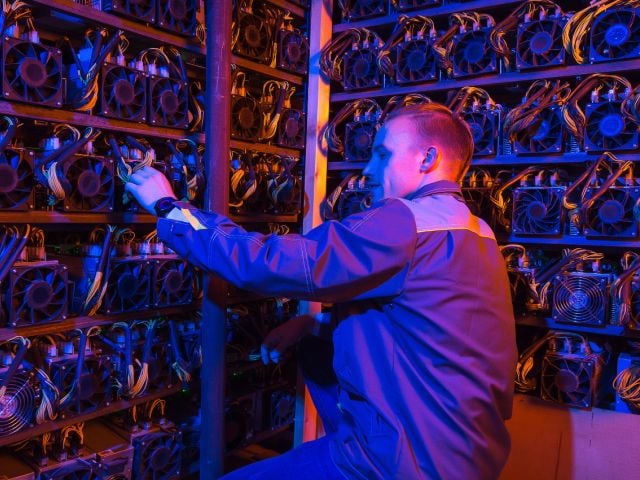WASHINGTON – The explosion of U.S. cryptocurrency mining operations and the electricity needed to power the computer-based financial transactions are hiking energy bills and greenhouse gases, according to a congressional investigation released today.
The seven largest crypto mining companies in the U.S. consume enough electricity to power every residence in Houston, the nation’s fourth largest city, with a population of 2.3 million people, the New York Times reports. The investigation was led by Rep. Jared Huffman (D-Calif.), Sen. Elizabeth Warren (D-Mass.) and other Democratic members of Congress.
The lawmakers sent a letter to the heads of the Environmental Protection Agency and the Department of Energy detailing their findings. They are urging both agencies to demand the crypto mining companies disclose details of their energy use and emissions.
One of the biggest crypto mining companies addressed in the investigation is Marathon Digital Holdings, which currently operates 33,000 computer arrays, up from roughly 2,000 in 2021. The company told the lawmakers it is slated to significantly increase the number to 199,000 by next year, as reported by the Times.
Bitcoin uses a software code, proof-of-work, that requires the use of massive, electricity-intensive computer arrays to authenticate transactions. Some crypto miners are relying on dirty fossil fuel powered facilities to supply the electricity for this work.
“At this point, the ‘currency of the future’ is dragging us back into the past when it comes to saving the planet from the climate crisis – just at a critical period when we’re seeing breakthrough progress to replace dirty, financially sketchy power sources like coal and fracked gas with cheaper, cleaner renewables like wind and solar,” said EWG President and Co-founder Ken Cook. “It’s hard to name an environmentally damaging source of electric power that U.S. bitcoin miners have not been willing to tap for profit.”
“There is an alternative to ranks of shipping containers packed with specialized computers and powered by dirty electricity,” Cook said. “These mining operations identified in the investigation can change from their original, computer- and electricity-intensive proof-of-work technology to secure, efficient cryptocurrency systems that require a small fraction of their current electricity needs.”
According to estimates by the University of Cambridge, proof-of-work operations use as much energy in a year as Greece, Sweden or the Netherlands. Yet bitcoin’s energy use is expected to continue to grow.
Other crypto currencies, like ethereum, are transitioning from proof-of-work to another method, proof-of-stake, which uses almost 100 percent less energy. This avoids proof-of-work’s contribution to the climate crisis, higher electricity bills and disastrous implications for electricity grids.
The situation involving energy-sapping crypto mining grew so dire this week in Texas, which is grappling with record temperatures, that mining operations in the state shut down to free up electricity demand on the power grid.
In March, the Environmental Working Group, Earthjustice, Greenpeace USA and several local advocacy groups launched the CleanUpBitcoin campaign calling for digital currencies like bitcoin to transition away from proof-of-work and the fossil-fuel-generated electricity it is currently using.
###
The Environmental Working Group is a nonprofit, non-partisan organization that empowers people to live healthier lives in a healthier environment. Through research, advocacy and unique education tools, EWG drives consumer choice and civic action.


